Expert Lawn Treatment Services
The Greens Master Difference
Our fertilizers contain NO chemical substitutes, carcinogens, or harmful coatings like heavy sulfur or nitrogen inhibitors.
We use only the highest quality, slow-release, mineral based, granular fertilizers with NO chemical substitutes, carcinogens, or harmful coatings like sulfur or nitrogen inhibitors. Our Weed Control and Mosquito and Insect Control Programs have been carefully crafted to give you the very best results while limiting chemical use with our fully Integrated Pest Management System. These too, are non-carcinogenic and non-trackable for your protection, our protection, and to better serve our environment and our community.
One Greens Master will be assigned specifically to service all your lawn and pest control needs. This means superior individualized service, a healthier lawn, fewer pests, and far better results than any other company.
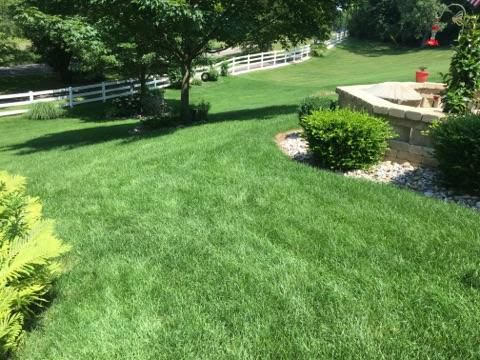
Grub Preventive
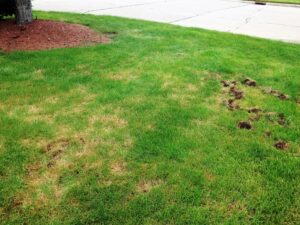 Annual grub preventive is necessary for nearly every lawn in Michigan. Without preventives applied annually, most lawns have close to a 50% chance each year of getting an infestation that causes damage. Lawns with surrounding wood lines, flowering landscapes, and trees (especially birch or any tree that flowers) are even more likely to be damaged. Once infestation has begun, other predators like skunks, moles, and crows also cause massive destruction while digging for them. Our Grub Preventive Program is far less expensive, more effective, is fully guaranteed, and less chemically invasive than indiscriminate contact controls and damage repairs needed after infestation has occurred. This program stops damage before it can start, only has to be applied once per year, is non-carcinogenic, and does not affect any other type of insect. If you already have an existing problem, contact killers are necessary to halt damage until preventives can be applied at the end of spring. If you believe you have grubs, please contact us immediately for a free analysis and estimate.
Annual grub preventive is necessary for nearly every lawn in Michigan. Without preventives applied annually, most lawns have close to a 50% chance each year of getting an infestation that causes damage. Lawns with surrounding wood lines, flowering landscapes, and trees (especially birch or any tree that flowers) are even more likely to be damaged. Once infestation has begun, other predators like skunks, moles, and crows also cause massive destruction while digging for them. Our Grub Preventive Program is far less expensive, more effective, is fully guaranteed, and less chemically invasive than indiscriminate contact controls and damage repairs needed after infestation has occurred. This program stops damage before it can start, only has to be applied once per year, is non-carcinogenic, and does not affect any other type of insect. If you already have an existing problem, contact killers are necessary to halt damage until preventives can be applied at the end of spring. If you believe you have grubs, please contact us immediately for a free analysis and estimate.
Crane Fly Preventive and Crane Fly Control
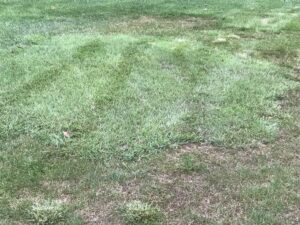 Crane flies (specifically European Crane Fly larvae) are an extremely damaging invasive lawn feeding insect that now causes damage each year to over 70% of lawns in the Oakland and Macomb County regions. Treatment for crane flies has become just as important as grub preventive over the past 10 years, and the population and area they affect is growing rapidly. Because they feed for an entire year and eat the root system as well as the rest of the grass plant, damage mimics several other types of damage, like rust disease, over-watering, and even drought stress. Most people (even most companies) don’t even realize they have crane fly problems until it’s too late. Like grubs, crane fly larvae attract predators such as skunks, moles, and crows who aggressively tear up the grass searching for them. Unlike grubs, however, crane fly adults emerge, mate, and lay eggs in late summer to fall, so preventives must be applied in early fall instead of late spring. Also, crane fly egg sites are very easy to see in fall as they turn the lawn a rusty-yellow or red color, and the tiny eggs can be seen on the grass blades. Preventives are far less expensive and more effective than treatments and damage repairs necessary after the fact. If you already have an existing problem, contact killers are necessary to halt damage until preventives can be applied at the end of summer. If you believe you have crane flies, please contact us immediately for a free analysis and estimate.
Crane flies (specifically European Crane Fly larvae) are an extremely damaging invasive lawn feeding insect that now causes damage each year to over 70% of lawns in the Oakland and Macomb County regions. Treatment for crane flies has become just as important as grub preventive over the past 10 years, and the population and area they affect is growing rapidly. Because they feed for an entire year and eat the root system as well as the rest of the grass plant, damage mimics several other types of damage, like rust disease, over-watering, and even drought stress. Most people (even most companies) don’t even realize they have crane fly problems until it’s too late. Like grubs, crane fly larvae attract predators such as skunks, moles, and crows who aggressively tear up the grass searching for them. Unlike grubs, however, crane fly adults emerge, mate, and lay eggs in late summer to fall, so preventives must be applied in early fall instead of late spring. Also, crane fly egg sites are very easy to see in fall as they turn the lawn a rusty-yellow or red color, and the tiny eggs can be seen on the grass blades. Preventives are far less expensive and more effective than treatments and damage repairs necessary after the fact. If you already have an existing problem, contact killers are necessary to halt damage until preventives can be applied at the end of summer. If you believe you have crane flies, please contact us immediately for a free analysis and estimate.
Lawn Surface Feeding Insects
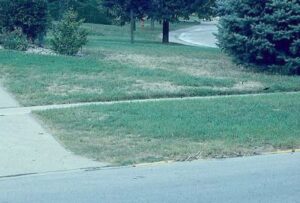 There are many types of lawn surface feeding insects that affect lawns each year. The most common are sod web worm and cinch bugs. These types of insects do not destroy the root system and usually only cause real damage to lawns that go unwatered in high heat/drought periods for more than a week or two. Because their larvae stay near the top of the soil, they are easy prey for insect predators like ants and spiders who can usually keep them under control without needing insecticides. In almost every case, watering and mowing properly is all that is required to limit damage. We only recommend insecticides for these if absolutely necessary because surface insect controls can also drastically reduce the natural predator populations as well which can cause a far worse out-break later. If you already had an existing problem that went untreated last year, or if you believe you have one now, please contact us immediately for a free analysis and estimate.
There are many types of lawn surface feeding insects that affect lawns each year. The most common are sod web worm and cinch bugs. These types of insects do not destroy the root system and usually only cause real damage to lawns that go unwatered in high heat/drought periods for more than a week or two. Because their larvae stay near the top of the soil, they are easy prey for insect predators like ants and spiders who can usually keep them under control without needing insecticides. In almost every case, watering and mowing properly is all that is required to limit damage. We only recommend insecticides for these if absolutely necessary because surface insect controls can also drastically reduce the natural predator populations as well which can cause a far worse out-break later. If you already had an existing problem that went untreated last year, or if you believe you have one now, please contact us immediately for a free analysis and estimate.Lawn Diseases
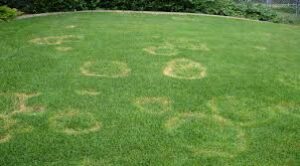 There are many types of lawn diseases that affect Michigan grass types. Most of them are topical/weather related and usually do not require fungicides. The most common of these are Leaf Spot, Red Thread, and Dollar Spot. Proper watering, proper mowing, and applying slow release, high nitrogen and potassium fertilizer throughout the growing season will almost always keep these diseases at bay without resorting to unnecessary and expensive fungicides.
There are many types of lawn diseases that affect Michigan grass types. Most of them are topical/weather related and usually do not require fungicides. The most common of these are Leaf Spot, Red Thread, and Dollar Spot. Proper watering, proper mowing, and applying slow release, high nitrogen and potassium fertilizer throughout the growing season will almost always keep these diseases at bay without resorting to unnecessary and expensive fungicides.
Unfortunately, there are several types of soil borne diseases that affect sod (usually less than 10 years old) and hydro-seeded lawns. The most common are Necrotic Ring Syndrome, Brown Patch/other Patch diseases, and rarely also, the topical diseases listed above if they came from the sod farm already in the soil. All soil borne diseases require bi-annual aerations (spring and fall). Patch diseases and most others also require fungicides 2x per year for 3-4 years until the symptoms dissipate and then 1x per year for 2 years to be sure the disease is gone. In most cases fungicides still must be applied as needed because the grass type installed is already susceptible. Over-seeding with resistant grass strains is extraordinarily helpful in all cases. Necrotic Ring Syndrome and Fusarium Blight should be treated with organic fertilizer and bi-annual aerations NOT fungicides. Organic fertilizer is less expensive, more effective, and naturally changes the soil condition over time so that the disease cannot thrive. Our Organic Soil Conditioner Program is designed specifically to treat lawns with these diseases. If you believe your lawn has disease issues, please contact us immediately for a free analysis and estimate. We save many of our clients thousands of dollars by fully analyzing lawns before treatment begins and only recommending services that are needed.
Aerating and Over-Seeding
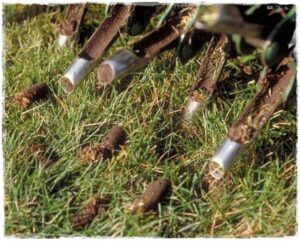 Done annually, fall aerations are helpful or even necessary to maintain a healthy lawn. This process helps break down thatch which will reduce damaging disease and insect activity, and to break up soil compaction so the root system can breathe and branch out easier. This allows for proper root development and therefore, thicker, healthier grass. Aerating also helps increase water retention in dry areas and provides for better drainage in heavy clay soils, ultimately cutting down on your watering bill and damage from pooling water. Over-seeding and/or re-seeding is highly recommended at this time for the best results possible. Lawns that are maintained by heavy mowers or where new sod has been installed over heavy clay (this is extremely common now) should also be aerated each spring. Please keep in mind that many lawns do not require aerations due to soil type and in some cases can actually harm grass. For this reason, it is essential that you contact us for a free lawn analysis to determine exactly what your lawn needs.
Done annually, fall aerations are helpful or even necessary to maintain a healthy lawn. This process helps break down thatch which will reduce damaging disease and insect activity, and to break up soil compaction so the root system can breathe and branch out easier. This allows for proper root development and therefore, thicker, healthier grass. Aerating also helps increase water retention in dry areas and provides for better drainage in heavy clay soils, ultimately cutting down on your watering bill and damage from pooling water. Over-seeding and/or re-seeding is highly recommended at this time for the best results possible. Lawns that are maintained by heavy mowers or where new sod has been installed over heavy clay (this is extremely common now) should also be aerated each spring. Please keep in mind that many lawns do not require aerations due to soil type and in some cases can actually harm grass. For this reason, it is essential that you contact us for a free lawn analysis to determine exactly what your lawn needs.
“I couldn’t be happier with my lawn, it always looks amazing even when the snow melts after winter it’s still green.”
Greens Master has better customer service than any other company I have used. Scot always leaves detailed notes on everything thing he sees on my lawn, and I love the fact they will always take the time to explain any questions I may have. I would never use anyone else.
Thanks for your submission!
We are currently reviewing your submission and starting to build out your personalized Greens Master experience.
Someone from our team will be in touch shortly!
